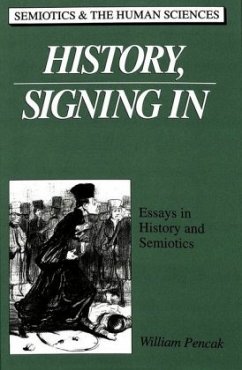History, Singing in is a double-entendre indicating the dual purpose of this book. First it marks the initial effort by a practicing historian to demonstrate the usefulness of semiotics for the discipline of history. Second, the essays in this volume on Charles S. Peirce, predecessors and successors of Peirce in the United States, the interpretation of historical texts such as Declaration of Independence and the Constitution, and the historical significance of music and film illustrate the working of signs in both history and the interpretation of history by great thinkers.
"The work of ... Pencak, in penetrating the traditional field of historiographical study from an explicitly semiotic point of view, is one of the most essential advances in the developing understanding of semiotics today." (John Deely, Loras College)
"Pencak ... participates in the paradoxical adventure of defining semiotics in the act of writing history ... Writing about (Carl) Becker as a past historian who signified the best of his discipline, (he) could not have more boldly seized upon the historiographical process itself than in his retrospective - and prospective - rendering of Carl Becker as a precursor to a semiotics of history." (Brooke Williams, Loras College)
"Pencak ... participates in the paradoxical adventure of defining semiotics in the act of writing history ... Writing about (Carl) Becker as a past historian who signified the best of his discipline, (he) could not have more boldly seized upon the historiographical process itself than in his retrospective - and prospective - rendering of Carl Becker as a precursor to a semiotics of history." (Brooke Williams, Loras College)

